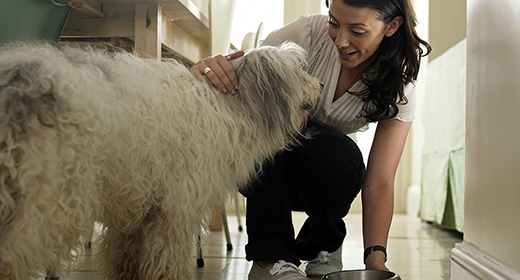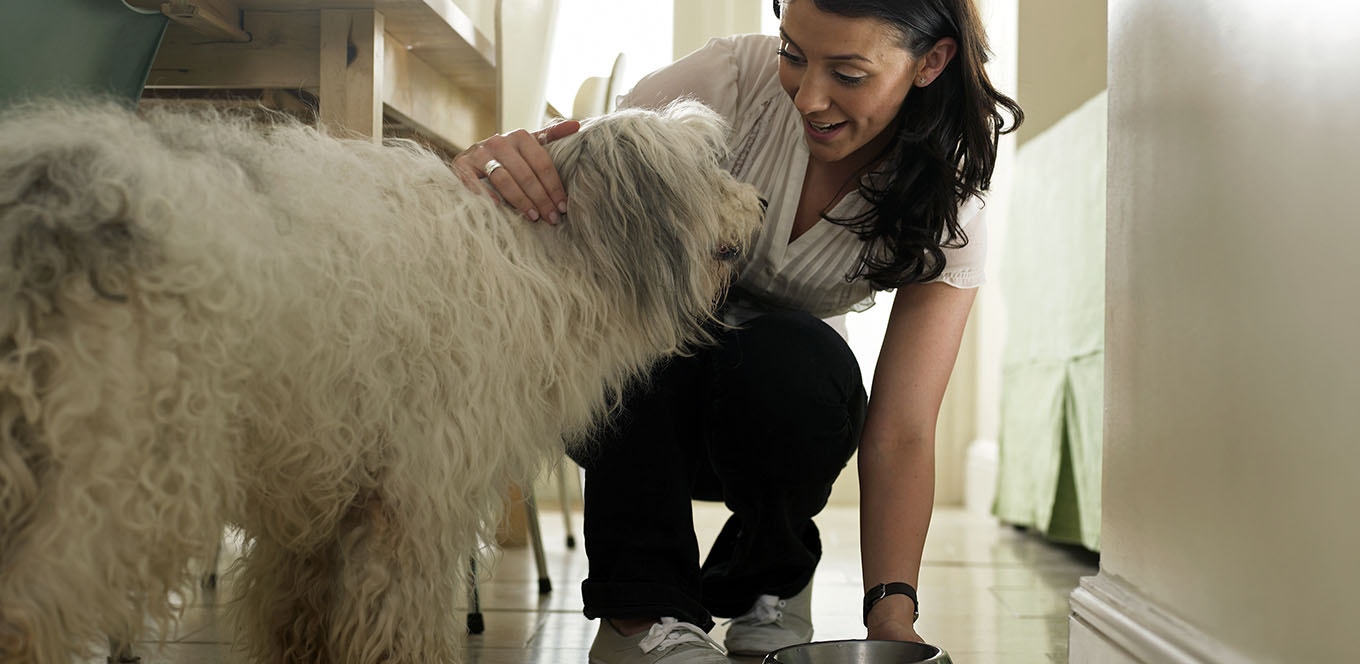

Dogs hit maturity around 7 years of age (5 years for larger dogs). It's not uncommon for them to live as long as 15 years. As your pet enters his golden years, his activity level might slow down and common conditions such as arthritis, diabetes, and kidney disease may arise. “It is so more important to monitor the eating habits of older pets,” stresses Tom Carpenter, DVM, president of the American Animal Hospital Association. “Generally, older pets do not need as much protein, sodium, and phosphorus. But your veterinarian needs to address this for your individual pet,” he says, adding that semiannual vet visits are recommended for an older animal.
Some mature dogs are prone to obesity. To test whether your dog is at a healthy weight, move your hands along his sides. If you can feel his ribs (but don't see them), he's doing okay. But if you feel a fat covering, or you visibly notice a rounded abdomen, he might be overweight. Exercise is still important for a senior dog, and if he's gained weight, you want to look for a low-fat weight-control food that contains vitamin-rich fish oils (IAMS™ ProActive Health™ Mature Adult is one good choice).
Other mature pets can become finicky eaters and lose weight as they age. 'Very old pets may actually need a more calorie-dense diet,' Carpenter says. Older dogs can lose their sense of smell and have a harder time chewing their food. To make mature dog food easier to eat, you can top their dry food with room-temperature wet food.
If your dog is gaining or losing a lot of weight, slightly decrease or increase his daily feedings. A sudden change in weight or appetite might be a sign of disease, so you should check with your vet. Water is also essential. 'Older pets are at a higher risk of dehydration,' Carpenter says. Provide a clean bowl with fresh water at all times.



Nutrients such as protein, fat, vitamins, and minerals are important players in the skin and coat health of dogs. To understand the role of these nutrients, it is necessary to start by understanding skin and hair.
The purpose of skin and hair is to block things from leaving (such as water or heat) or entering (such as viruses and bacteria) the body.
The hair coat is composed almost entirely of protein. If the animal's diet doesn't contain adequate protein quantity and quality, hair may fall out, or become dry, weak and brittle.
Skin is made up of squamous cells, flat cells tightly packed together. These cells have tough membranes that are composed of proteins and fats. Without proper amounts of these nutrients, cell membranes weaken, allowing water to escape and bacteria and viruses to enter more easily.
Proteins are found in both animal-based and plant-based ingredients. Animal-based proteins contain all the essential amino acids dogs need, whereas plant-based proteins may contain only some essential amino acids. Animal-based proteins help dogs achieve optimal health.
Fats can also be found in both animal-based and plant-based ingredients. They are incorporated into skin cells as fatty acids. There are two essential fatty acids for skin and coat health. Linoleic acid maintains skin and coat condition in dogs. Without enough linoleic acid dogs may experience dull, dry coat, hair loss, greasy skin and increased susceptibility to skin inflammation.
Both of these essential fatty acids are omega-6 fatty acids and are found in animal tissues like chicken fat. Linoleic acid is also found in some vegetable oils, such as corn and soybean oils.
Most commercial dog diets contain more than adequate amounts of omega-6 fatty acids. Because these fatty acids can be converted to compounds that increase susceptibility to skin inflammation, it is important to balance the amount of omega-6 fatty acids in the diet with omega-3 fatty acids, which reduce susceptibility to inflammation.
Omega-3 fatty acids are found in oils from fish and some plants (canola and flax).
IAMS research has found that combining fat sources in the diet at a ratio of 5-10 omega-6 fatty acids to 1 omega-3 fatty acid results in excellent skin and coat health.
Vitamins and minerals are essential for the development of healthy skin and hair coat. The best way to provide these nutrients is through a complete and balanced diet containing appropriate amounts of essential vitamins and minerals rather than through supplements.
| Vitamin or Mineral | Importance to Skin and Coat Health |
| Vitamin A | Necessary for growth and repair of skin |
| Vitamin E | Protects skin cells from oxidant damage |
| Biotin | Aids in the utilization of protein |
| Riboflavin (B2) | Necessary for fat and protein metabolism |
| Zinc | Necessary for fat and protein metabolism |
| Copper | Involved in tissue pigment and protein synthesis |
Diet is often believed to be a factor when changes in skin and coat condition are noticed. The most common causes of these changes, however, are season and life stage.
As cold weather approaches, most dogs grow a thick coat to help keep heat in and cold air out. As the weather begins to warm up, they shed the thick, heavy coat.
Most puppies are born with soft fuzzy hair, but as they age, a coarser coat grows. Pregnant or lactating dogs also may experience a change in coat condition or hair loss. And, as with humans, the hair on dogs may thin out and become coarser and white as they reach their senior years.